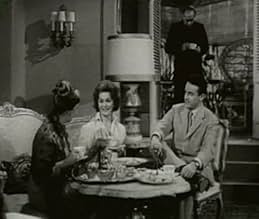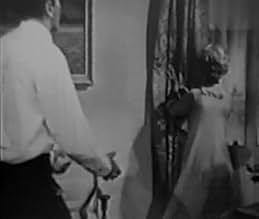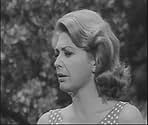Aggiungi una trama nella tua linguaA collection of tales about paranormal events, horrifying folklore, and the world of the unknown.A collection of tales about paranormal events, horrifying folklore, and the world of the unknown.A collection of tales about paranormal events, horrifying folklore, and the world of the unknown.
Sfoglia gli episodi
Trama
Lo sapevi?
- QuizThrough an oversight, Worldvision didn't renew the copyrights on most episodes of this series when they expired in the late 1980s, and they thus fell into the public domain. Since royalties didn't have to be paid to Worldvision, the result was a revival of the series on UHF and cable television and on VHS and DVD. Since well-worn syndication prints were and are typically used by those media, the results often leave something to be desired, quality-wise. Despite the public domain status for most episodes, the series' remaining copyrights belongs to its distributor CBS Television Distribution. CTD is the successor to the series' previous distributors, which include ABC Films successor Worldvision Enterprises and CTD's predecessor Paramount Domestic Television.
- Citazioni
John Newland: [episode introduction] What you are about to see is a matter of human record. Explain it: we cannot. Disprove it: we cannot. We simply invite you to explore with us the amazing world of the Unknown... to take that One Step... Beyond.
- Versioni alternativeWhen this was run on network television (ABC), it was titled "Alcoa Presents: One Step Beyond." The 16mm television syndication prints carry the title of simply "One Step Beyond."
- ConnessioniFeatured in Television: The First Fifty Years (1999)
Recensione in evidenza
As for the inexplicable "One Step Beyond"-"Twilight Zone" rivalry (if you can call it that), where do I begin? First of all and most important, they were both excellent shows, each in its own way. "Zone" is undoubtedly a popular and well-known classic, while "Beyond" is a lesser known near-classic with a relatively small but loyal following. Also, the latter was not based on fictional works, but dealt with strange events that were supposed to have actually happened.
Rod Serling was a better host than John Newland, but then he had a much stronger screen persona. Since the stories Newland introduced were supposedly true, his understated, scholarly approach was more appropriate, and there was no need for cleverly written lines and sardonic wit. They both served their respective shows well, and in the long run it matters not one iota who hosted what, or if there were no hosts at all. Each series was driven by the quality of their stories, and neither would have lasted longer than the standard thirteen episodes without an interesting tale to tell.
And since "Zone" was on twice as long as "Beyond", it obviously produced more episodes, and that's not always a good thing. Let's face it, there were quite a few poor stories that most of us avoid whenever they turn up (you know which ones they are). On the other hand, I have never seen a single episode of "Beyond" that wasn't interesting and entertaining. So the latter series actually had a better track record of consistent quality. Not bad for an also ran.
The production values on "Beyond" were certainly on a par with the average half hour show of that time, and since there were no spaceships or aliens, no lame effects were used. And it employed the talents of performers who invested their material with conviction and authenticity to spare, from long-established character actors to rising stars, such as: Christopher Lee, William Shatner, George Grizzard, Charles Bronson, Louise Fletcher, Patrick O'Neal, Robert Loggia, Suzanne Pleshette, Pernell Roberts, Patrick Macnee, Paul Richards, Edward Binns, Jack Lord, Ross Martin, Donald Pleasence, Elizabeth Montgomery, and even Warren Beatty.
As for the stories, there's too many to choose from, and limiting examples to only a couple was a tough call, but two of my favorite episodes are as follows:
In "Doomsday", the great Torin Thatcher appears as a 17th century lord who condemns a witch to death. She sets a curse upon him, his son dies, and so it will be with the lord's descendants, for generation after generation, that each head of the family will be predeceased by his eldest son and heir. Nearly 300 years later, the current head of the family (Thatcher again) is on his deathbed, and his eldest son is terrified, waiting for the curse to strike as it always has before. But then... It's a tragedy with a twist.
In "The Devil's Laughter", another great, underrated character actor, Alfred Ryder, plays John Marriott, an English murderer waiting to be hanged in 1895. The frightened man is eventually led up to the gallows, the noose is placed, and the lever is pulled. But the rope breaks. After being revived, Marriott is no longer afraid, and calmly goes to the gallows again. But the trap door won't spring. Finally, Marriott receives clemency and is set free. And then... The story is both grim and funny, and very well done.
As for the "based on actual events" aspect of the series, "based on actual claims" would be more accurate. I had heard about some of the claims elsewhere, and so they were indeed based on something which supposedly took place. Whether you believe these actually occurred, or were the product of the supernatural or a more reasonable explanation, is beside the point. That they could have happened, or that someone claimed as much, gives the series an extra shudder or chill that "Zone" can't duplicate. And episodes were always recounted in an intriguing and compelling manner.
Unfortunately, the last I saw of "One Step Beyond" was at least six or seven years ago on the Sci-Fi Chanel, where "Zone" episodes now reside ad infinitum. It's long past time to resurrect the former for another round or two, or three. It's also time to give this otherwise underappreciated series the respect it deserves. While admittedly not as great as the other show, "Beyond" nevertheless has carved out its own niche as the best of its particular genre.
Rod Serling was a better host than John Newland, but then he had a much stronger screen persona. Since the stories Newland introduced were supposedly true, his understated, scholarly approach was more appropriate, and there was no need for cleverly written lines and sardonic wit. They both served their respective shows well, and in the long run it matters not one iota who hosted what, or if there were no hosts at all. Each series was driven by the quality of their stories, and neither would have lasted longer than the standard thirteen episodes without an interesting tale to tell.
And since "Zone" was on twice as long as "Beyond", it obviously produced more episodes, and that's not always a good thing. Let's face it, there were quite a few poor stories that most of us avoid whenever they turn up (you know which ones they are). On the other hand, I have never seen a single episode of "Beyond" that wasn't interesting and entertaining. So the latter series actually had a better track record of consistent quality. Not bad for an also ran.
The production values on "Beyond" were certainly on a par with the average half hour show of that time, and since there were no spaceships or aliens, no lame effects were used. And it employed the talents of performers who invested their material with conviction and authenticity to spare, from long-established character actors to rising stars, such as: Christopher Lee, William Shatner, George Grizzard, Charles Bronson, Louise Fletcher, Patrick O'Neal, Robert Loggia, Suzanne Pleshette, Pernell Roberts, Patrick Macnee, Paul Richards, Edward Binns, Jack Lord, Ross Martin, Donald Pleasence, Elizabeth Montgomery, and even Warren Beatty.
As for the stories, there's too many to choose from, and limiting examples to only a couple was a tough call, but two of my favorite episodes are as follows:
In "Doomsday", the great Torin Thatcher appears as a 17th century lord who condemns a witch to death. She sets a curse upon him, his son dies, and so it will be with the lord's descendants, for generation after generation, that each head of the family will be predeceased by his eldest son and heir. Nearly 300 years later, the current head of the family (Thatcher again) is on his deathbed, and his eldest son is terrified, waiting for the curse to strike as it always has before. But then... It's a tragedy with a twist.
In "The Devil's Laughter", another great, underrated character actor, Alfred Ryder, plays John Marriott, an English murderer waiting to be hanged in 1895. The frightened man is eventually led up to the gallows, the noose is placed, and the lever is pulled. But the rope breaks. After being revived, Marriott is no longer afraid, and calmly goes to the gallows again. But the trap door won't spring. Finally, Marriott receives clemency and is set free. And then... The story is both grim and funny, and very well done.
As for the "based on actual events" aspect of the series, "based on actual claims" would be more accurate. I had heard about some of the claims elsewhere, and so they were indeed based on something which supposedly took place. Whether you believe these actually occurred, or were the product of the supernatural or a more reasonable explanation, is beside the point. That they could have happened, or that someone claimed as much, gives the series an extra shudder or chill that "Zone" can't duplicate. And episodes were always recounted in an intriguing and compelling manner.
Unfortunately, the last I saw of "One Step Beyond" was at least six or seven years ago on the Sci-Fi Chanel, where "Zone" episodes now reside ad infinitum. It's long past time to resurrect the former for another round or two, or three. It's also time to give this otherwise underappreciated series the respect it deserves. While admittedly not as great as the other show, "Beyond" nevertheless has carved out its own niche as the best of its particular genre.
I più visti
Accedi per valutare e creare un elenco di titoli salvati per ottenere consigli personalizzati
- How many seasons does One Step Beyond have?Powered by Alexa
Dettagli
- Tempo di esecuzione25 minuti
- Colore
- Proporzioni
- 1.33 : 1
Contribuisci a questa pagina
Suggerisci una modifica o aggiungi i contenuti mancanti

Divario superiore
By what name was One Step Beyond (1959) officially released in India in English?
Rispondi





































